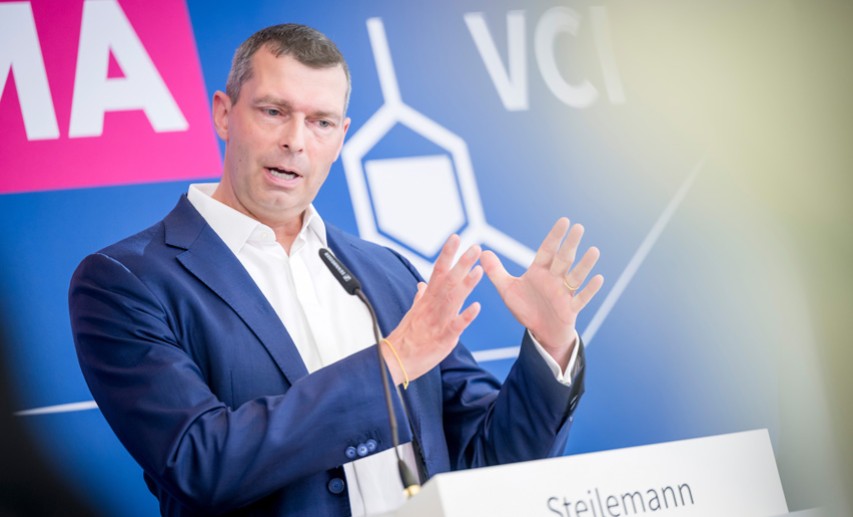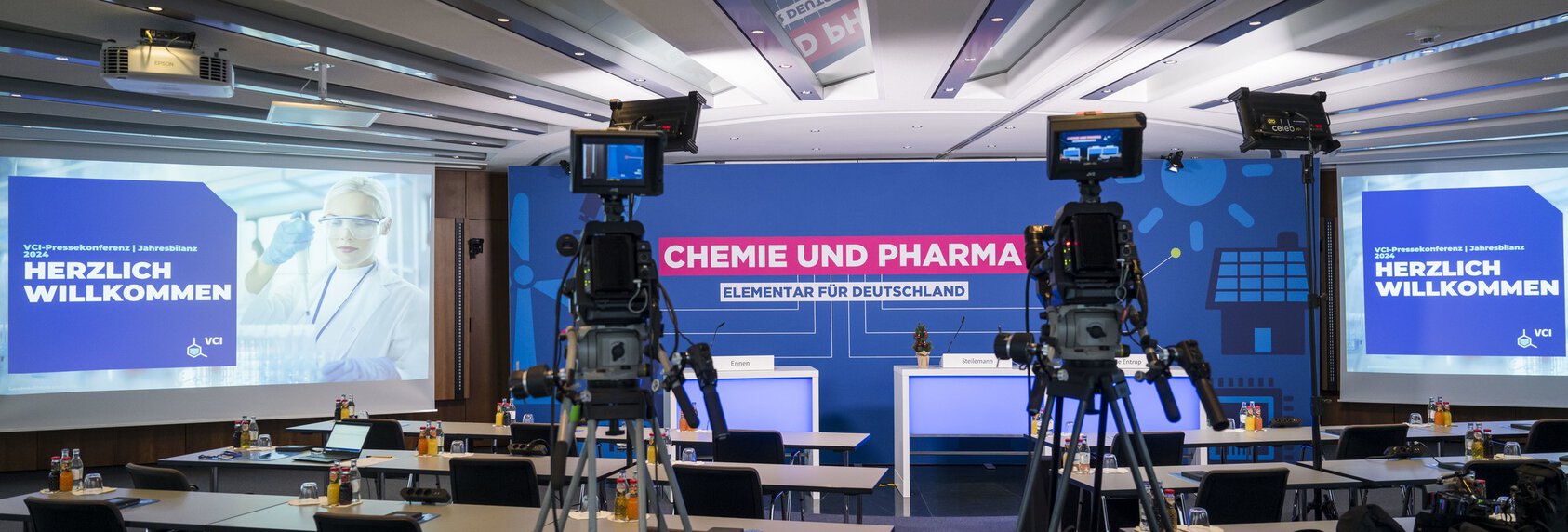08 July 2024 | Pressemitteilung
Downloads
-
Key Figures
PDF | 273 kB | Version as of: 08 July 2024
The chemical-pharmaceutical industry has presented its half-year results for 2024.

- Production increase in 1st half-year by 3 percent
- Industry’s sales drop by 1 percent against the previous year
- Producer prices fall by 4 percent
- VCI maintains its forecast: production + 3.5 percent and sales + 1.5 percent
- Transformation is at stake: politicians must act for location conditions
The 1st half of 2024 turned out better than expected for the chemical-pharma-ceutical industry in Germany, which saw a drop in the industry’s sales and falling producer prices while production increased slightly. But irrespective of some individual positive signals, the mood in the industry remains subdued. In particular, the domestic business is disappointing.
VCI President Markus Steilemann comments on the current situation: “There is a silver lining but one cannot speak of a stable upward trend. The small signs of recovery are no reason to rejoice. In fact, we are expecting the order situation to improve over the course of the year. However, the signals of a slight relaxation should not let us lose sight of the location problems: In addition to a lack of orders, the energy prices and bureaucracy are what worries us most.”
Overall, the 1st half of 2024 for the industry resembled the weather – it was characterised by sunny and rainy spells. More orders from customers at home and abroad brought for the industry a production increase by 3 percent in the past six months. All the same, production was still around 11 percent lower than back in 2021. This means that many plants were still not operating to capacity and remained below the rentability threshold.
After the earlier sharp slump, especially basic chemicals regained ground. From January to June 2024, the production of inorganic basic chemicals was 12 percent higher than in the previous year. The output of organic basic chemicals also rose considerably by 8.5 percent. Production growth was significantly lower in all other sectors of chemistry: The output of consumer-related chemicals went up only slightly (+2 percent); the same holds true for polymer production (+1.5 percent). The production of specialty chemicals was down once again (-2 percent). That was because many industrial customers curbed their production in the 1st half-year so that they were reserved about placing orders.
Confidence comes from the pharmaceutical business. Since the beginning of 2024, signs have been pointing to growth again. Production improved by 1.5 percent in the period under review. The high demand resulted in sales growth by 6 percent.
The industry’s sales from chemistry and pharmaceuticals totalled around 112 billion euros in the 1st half of 2024 and were thus around 1 percent lower than one year earlier. The main reason was that producer prices came under pressure in the said six months. They fell by 4 percent on average in the industry.
Despite rising sales volumes, the revenue situation remains disappointing especially in domestic business, with a decline by 5 percent being recorded. After a long difficult period, things are getting better in foreign business. From January to June 2024, a minor increase of 1.5 percent against the previous year was achieved in sales of export products.
2nd half of 2024: economic situation improves – mood subdued
The order situation for chemical companies should continue to improve in the further course of the year in economic terms. In view of this development, the VCI maintains its forecast for 2024 as a whole: production increase by 3.5 percent and sales increase by 1.5 percent – with foreign business remaining the essential driver.
However, now as in the past the mood is subdued in the industry. The results of the most recent VCI membership survey show that only 30 percent of companies are already noting an economic recovery. Roughly 50 percent are hoping for business to improve in the 2nd half of 2024 or in the course of 2025.
VCI President Markus Steilemann emphasizes: “The truth is also that every fifth company still sees no light on the horizon and the economic recovery is a long way away. We must not forget this: we have ramped up production, but our plants are still not running profitably – and this has been so for over two and a half years.” The structural disadvantages in Germany are excessively heavy burdens. Therefore, the companies are expecting their earnings situation to further deteriorate in the overall year 2024.
Location problems remain the greatest obstacle
More than 70 percent of companies feel massively held back by regulatory requirements. This means that red tape remains the greatest obstacle for business. Reasons are not only the costs ensuing from bureaucracy – which, according to the VCI membership survey, meanwhile amount to circa 5 percent of sales – but also the continuously rising number of new regulations which cause too much of a strain for companies. High energy prices remain another significant cost factor for businesses. 45 percent of companies still see this as a major burden on business activities. Steilemann observes: “Political counter-measures can and must be taken in all points. The government coalition claims to be doing this, but reality is different.”
Lack of orders, high energy prices, growing bureaucracy. With this blend, more and more companies are deciding against Germany as a business location. It emerges from the VCI membership survey that in 2023 the industry’s investments in this country fell by 2 percent to 9.2 billion euros. At the same time, investments abroad rose by well over 8 percent to around 12 billion euros. Moreover, the competitive conditions in Germany act as a deterrent for rising numbers of foreign investors. As a result, the transformation with which Germany wants to become a pioneer for forward-looking technologies threatens to stall.
Tap unused potential
However, the VCI is convinced that Germany has sufficient potential for innovation to be a technology nation of the future. What is missing are the right framework conditions to use this potential in a competitive manner. From the VCI’s viewpoint, three measures are particularly important:
- Reduce charges
Competitive energy prices by easing the burdens from electricity tax and grid fees. Furthermore, cuts in company and corporate taxation and an end to the solidarity surcharge. - Improve basic conditions
Investments in education, security and infrastructure, including the expansion of electricity grids, as public services – partly also publicly funded. - Refresh competition rules
Less bureaucracy for more investment incentives – at national and EU levels.
Some of these measures can be implemented at no cost through smart political decisions. Others – such as the funding of infrastructure, education and security – require investments. The new household plan and the federal government's growth package are not enough. Only with a change in prioritization measures that contribute to more growth and innovation can ultimately be implemented.
The VCI calls on the government coalition parties and the CDUCSU to take joint and decisive action in order to regain the lost trust of companies, investors and, last but not least, the public at large.
But the following is also clear, so that Steilemann encourages: “We do not just need reforms where the very facts are concerned – we also need a mental change. The nation must become more proactive and dynamic. A joint, honest effort is necessary to develop a national transformation agenda with a long-term orientation that lasts beyond one legislative term. I am urging the parties of the political centre to come together and form an alliance for transformation. It is high time for us to overcome the thinking in camps and the selfishness – for all of us to work together in a shared hands-on approach.”
The VCI and its sector associations represent the interests of around 2,300 companies from the chemical-pharmaceutical industry and related sectors vis-à-vis politicians, public authorities, other industries, science and media. In 2023, the VCI member companies realised sales of ca. 245 billion euros and employed more than 560,000 staff. Contact: VCI Press Department, phone: +49 69 2556-1496, e-mail:
presse@vci.de
VCI on X
